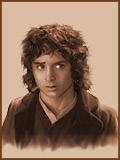
A few weeks ago I finished reading J.R.R Tolkien's The Children of Hurin. This book is a real tragedy, meaning all the main characters die. There is no hope. Nothing good comes from the work of Hurin's children. They are doomed, cursed,by Morgoth and cannot escape. Although this novel is very dark and despairing I found many truths about Christianity in it.
J.R.R Tolkien was a real Christian writer, more then that a Catholic writer. Everything he wrote has a hint of Christianity in it ,even a tragedy like The Children of Hurin. Hurin's offspring are cursed by Morgoth, a fallen valar, because of Hurin's pride. Hurin joins with some of the elves in attacking Morgoth's fortress. Their contempt of Morgoth is a good thing. The problem is that they try to go against a power beyond them by themselves their own. They go against the will of the Valar by the assault of Morgoth. They cannot win. Although Morgoth is a fallen Valar he is still more powerful then men and elves. Tolkien did not believe in allegories but he did use analogies. The Children of Hurin seems clearly to be an analogy of our position before the Incarnation and what would have happened if Christ had not taken flesh and redeemed us. We were doomed. There was no hope for us. We couldn't save ourselves. No matter how good men tried to be the race was doomed,fighting against powers way beyond the powers of immortals, Satan and his minions. Hurin's children, like the children of Adam, were cursed.
The children of Hurin is not only an analogy of life without Redemption it is also an analogy of our situation now. Christ has come to earth and saved us by his death and Resurrection. We now have HOPE! We can get to Heaven. We are saved...BUT.. but it is up to us. Christ has saved us but because of our free will we have to choose to except Christ's saving grace. Hurin's son Turin was offered forgiveness. Why didn't he accept it? He was too proud. He was too proud to accept the forgiveness of others. So often in my own life I have been to proud to say sorry, to ask for forgiveness. When I ask for forgiveness I make myself vulnerable. I count on the other person to give me their pardon. There is always the risk that they may not. Turin was not willing to take that risk. He wanted to do everything all on his own. He didn't want forgiveness. He wanted to become powerful to make others as proud of him as he was of himself. Often we as Christians do the same thing, we want to be our own Savior. We don't want God's help. To accept God's help would be to acknowledge our own weakness.

The Children of Hurin resounds with the message "He has cast down the mighty from their thrones and has lifted up the lowly". King Thingol, an elf, though he loves Turin as a son will not help him until he repents. He offers him forgiveness if he will give up his wild ways and return to him but Turin refuses.Turin's ultimate act of despair in the end is the fate of all those who try to live their way instead of God's, "Their glory lasts a moment;their beauty fades with the morning sun" as the Psalm says. For those who acknowledge their nothingness, their incapability to do anything without God, they will share in the final victory and have glory everlasting. We, as St. Paul says, cannot glory in ourselves but only in Christ.








That is like the most beautiful and sad post I have ever read! It makes so much sense.
ReplyDelete